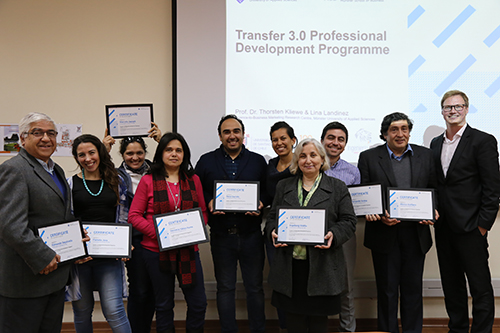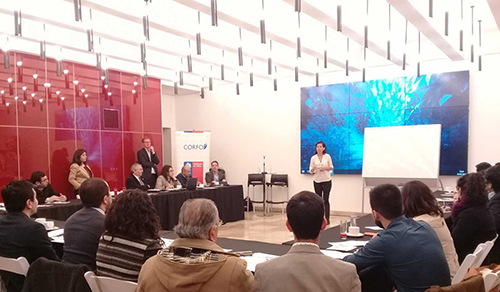Prof. Kliewe and Lina Landinez successfully complete Professional Development Programme for the University of Santiago in Chile
July 29, 2017
|
 How can a university strategically develop its exchange processes with companies and other social actors? This was the task of a three-member delegation from the Münster University of Applied Sciences (MUAS): Prof. Dr. Thorsten Kliewe, Lina Marcela Landinez Gomez and Carsten Schröder travelled to Chile.
How can a university strategically develop its exchange processes with companies and other social actors? This was the task of a three-member delegation from the Münster University of Applied Sciences (MUAS): Prof. Dr. Thorsten Kliewe, Lina Marcela Landinez Gomez and Carsten Schröder travelled to Chile.
The Universidad de Santiago de Chile (USACH) is one of the most traditional Chilean universities. By far the largest faculty is engineering science with around 10,000 students. The faculty successfully applied for the "Engineering 2030" national initiative and was supported by MUAS in the implementation of a sub-project.
"The faculty's strategic goal is, among other things, to better integrate projects with companies in the curriculum" says Schröder, vice president for research management and transfer at MUAS. To support the university in the further development of their engagement approach, MUAS provided a Professional Development Programme for 10 USACH researchers and professionals. After a first visit to Santiago and a one-week visit to Münster, the final workshop of the Professional Development Programme took place in Santiago in the last week of July.
The project was coordinated by Prof. Dr. Thorsten Kliewe and Lina Marcela Landinez Gomez from the Science-to-Business Research Marketing Centre at MUAS. "We have been supporting foreign educational institutions for quite some time by tailor-made professional training programs that focus on the personal development of scientists and administrative staff," says Kliewe.

In addition to many talks with Chilean universities and scientific authorities, the MUAS team also organized a workshop at the Corporación de Fomento de la Producción (CORFO). At the State Economic Promotion Agency in Santiago de Chile, some 30 participants from 14 Chilean universities and representatives of CORFO met and discussed university strategies. Many scientists see their main focus in basic research. To date, companies are only looking for a limited exchange with universities, not all international corporations have research capacities in the country. "Cooperation between science and business continues to be a major strategic challenge for Chile, where our university would like to continue to support its Chilean partner institutions," Schroeder notes the week in South America.

Lina Landinez moderating a discussion among 14 universities
|
|